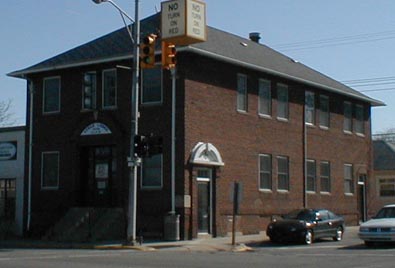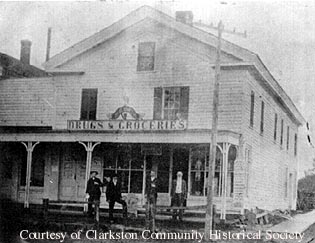
![]() Walking Tour-1 East Washington Street-Walking Tour Home Page
Walking Tour-1 East Washington Street-Walking Tour Home Page![]()
(Fronts On Main Street)

![]() Walking Tour-1 East Washington Street-Walking Tour Home Page
Walking Tour-1 East Washington Street-Walking Tour Home Page![]()
(Fronts On Main Street)
The red brick building which stands on this site now was built as the Masonic Temple in 1916. The roof of the new building burned in 1922 when a fire started in a frame building to the north. The interior was gutted. A carnival was held in town to raise funds to repair the damage. (See Photos/Events)
The Masonic Lodge was chartered January 13, 1852 with 10 members. Horatio Foster, one of Clarkston's first harnessmaker/blacksmiths was the first Master followed by Enos Church, owner/operator of a foundry and cloth mill; Henry Hirst, part owner of the Clarkston mills; Nicholas Bonaparte Smith, drugstore owner; John Peters, Smith's partner for a time; and John Harvey Dresser, insurance agent. The Masons held their meetings on the second floor of this new building as they did in the old Greek Revival style building which had previously stood on the same site.
The first floor of the old wood building was given over to commercial use. Doctors Nelson Abbey & Horace Robinson had a drugstore a least by 1855 on the site, that is, in 27 & 1/2' X 60' in the southwest corner of the first floor of the building .In 1857 Abbey & Robinson according to tax records were joined by N.B. Smith for this space. In 1960 the tax records listed "Hirst & Robinson" and John Dresser for this site. (Reportedly Dresser who had run the inn on South Main for a short time also ran a store for a time before becoming an insurance agent in a building which stood on the site of 15 S. Main.) Abbey was replaced by J. Peters as Robinson's partner in 1862.
 The Smith Brothers, then Nicholas Bonaparte Smith alone operated a store here until Smith's death in 1895. (For a time, Nicholas Smith was in business with an Urch in a wood building south of Milton H. Clark's store on the southwest corner of W. Washington & South Main Sts.) Apparently others also occupied space in this building during its lifespan. Carran Implements, Albert Carran, proprietor, was reportedly located in the north half of this building. Francis J. Walter listed in tax records (see tax record synopsis for 4/6 N. Main) as a cabinet maker/undertaker apparently had a shop in the north 1/2 in the 1860s. He was followed in this space by Wm. V. B. Vliet, undertaker. Note: this site, which originally included the property of the existing on story building to the north, actually contained 2 Greek Revival style buildings with broken pediment- gable roofs facing Main St. connected by a flat roofed section. Leman Gulick had a barbershop on the first floor of one of these buildings for a time. Also one report has it that Isadore/Esidore Jossman had a store in a corner of one of these buildings and started the first bank in Clarkston here with J. C. Bird. (Other accounts cite two other locations on Main St.) A millinery, for a time occupied the flat roofed section.
The Smith Brothers, then Nicholas Bonaparte Smith alone operated a store here until Smith's death in 1895. (For a time, Nicholas Smith was in business with an Urch in a wood building south of Milton H. Clark's store on the southwest corner of W. Washington & South Main Sts.) Apparently others also occupied space in this building during its lifespan. Carran Implements, Albert Carran, proprietor, was reportedly located in the north half of this building. Francis J. Walter listed in tax records (see tax record synopsis for 4/6 N. Main) as a cabinet maker/undertaker apparently had a shop in the north 1/2 in the 1860s. He was followed in this space by Wm. V. B. Vliet, undertaker. Note: this site, which originally included the property of the existing on story building to the north, actually contained 2 Greek Revival style buildings with broken pediment- gable roofs facing Main St. connected by a flat roofed section. Leman Gulick had a barbershop on the first floor of one of these buildings for a time. Also one report has it that Isadore/Esidore Jossman had a store in a corner of one of these buildings and started the first bank in Clarkston here with J. C. Bird. (Other accounts cite two other locations on Main St.) A millinery, for a time occupied the flat roofed section.
The double Greek Revival style buildings had all the hallmarks found in Midwestern adaptations of the style: the gently pitched gable roof; the wide entablature of the broken pediment; and the symmetry of the original 9 over 6 light windows on the second story. A circa 1900 photo shows the large plate glass display windows on the Main St. facade under the eaves of a porch which was probably an addition.
According to an item in the 2/09/1905 issue of the Oakland County Post " The Masons are considering the advisability of acquiring the property
In 1914 Thomas L. Parker had a business on the first floor. A 1921 Community News ad listed his wares as "harnesses, trunks, robes" & "family shoe repair". By 1918 he owned the building which he built at 3 N. Main.
Floyd Andrews moved one half of the old wooden Greek Revival building to the site of 20 N. Main, transfering his blacksmith shop from a building just south of the stream (on the east side of Main) to the first floor, using the second as a residence. Previously the other Greek Revival building had reportedly been moved to join an existing building, the inn/tavern on South Main, now 20, 22, and 24 South Main.
Official Property Description:
Significant Property History:
[A Synopsis Of Property Transfers Derived From Abstracts
(when available) And Periodic Changes In Ownership Or
Assessed Value Derived From Township Tax Records]